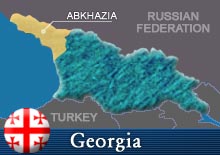 Clicking the title of this post will take you to the web site of the excellent organization Radio Free Europe. Among the many issues you can find covered there include the developing crisis between Russia and Georgia, a crisis precipitated by Georgia's detention last week of four Russian officers accused of spying. Since then the Russian government has retaliated in several serious ways. Below are a few of them as reported in RFE's daily updates (with a bit of editing on this end).
Clicking the title of this post will take you to the web site of the excellent organization Radio Free Europe. Among the many issues you can find covered there include the developing crisis between Russia and Georgia, a crisis precipitated by Georgia's detention last week of four Russian officers accused of spying. Since then the Russian government has retaliated in several serious ways. Below are a few of them as reported in RFE's daily updates (with a bit of editing on this end).* Police officials from the economic-crimes unit in Moscow took a number of retaliatory steps against Georgia and Georgian economic interests on October yesterday. Police raided the Georgian Embassy's guest house in the city center, claiming that it was being run illegally and that the building in fact belonged to the state-owned Melodia music company. Moscow city authorities said they confiscated 500,000 bottles of Georgian wine that managed to evade a Russian import ban imposed earlier this year. Two popular Georgian restaurants in Moscow could be closed for irregularities concerning the wine they serve to customers. Police also closed a casino, Krystall, claiming that it was controlled by Georgian criminals and could not provide clear documentation for its gambling tables and slot machines.
* Lyudmila Alekseyeva, president of the International Helsinki Federation for Human Rights, claims that police are arresting members of several Georgian families from their Moscow homes "simply on nationality grounds." The people targeted, Alekseyeva said, are members of families that fled the bloody conflict in Abkhazia at the beginning of the 1990s and have lived in the same building in Moscow since. Since the start of the current crisis between Russia and Georgia last week, there has been a flood of Russian media reports about Georgian criminality. Roin Konjaria, vice president of the Moscow Georgian Community, a social and educational organization, told "The Moscow Times" on October 3 that between 150,000 to 200,000 Georgians currently live in Moscow and some 500,000 throughout Russia.
* Georgian citizens in Russia have expressed concern over the worsening tension between the two countries. "The Moscow Times" quoted Georgian social activist Joni Kvaratskhelia, head of the Lazare youth organization in Moscow, as saying that "this affects every Georgian. We're having unfriendly relations with Russia, yet we have a lot of Russian friends. It's uncomfortable to view one another as enemies." Kvaratskhelia said the organization has received numerous calls from Georgians in Moscow looking for advice. Interfax on October 3 quoted State Duma Speaker Boris Gryzlov as saying that the Russian parliament is taking steps to block bank transfers between Russia and Georgia. The sanctions could severely disrupt trade between Georgia and its biggest trading partner and create enormous hardship for the families of Georgian and Russian citizens who regularly send money to their relatives in Georgia.
* Russian Foreign Minister Sergei Lavrov has ruled out a rapid end to the sanctions Russia has implemented against Georgia. Lavrov said the suspension of transport and mail links was aimed in part at preventing money flows from Russia being used to fund a Georgian military buildup. Lavrov said Georgia is expanding its military so it can forcibly regain control of its two breakaway regions, Abkhazia and South Ossetia, which receive significant support from Russia, the New York Times reported. Lavrov said Georgia's seizure of the four Russian officers last week was only "one episode in an anti-Russian campaign" pursued by Georgian President Mikheil Saakashvili, and that simply handing back the officers was not sufficient to change Moscow's mind about sanctions. Lavrov was quoted as saying that "we don't want everything to be as it was before, because everything was very bad." He added that money being sent from Russia to Georgia included the proceeds of organized crime, and had been used to fund arms purchases and pay for the call-up of military reservists.
* Foreign Minister Lavrov on October 4 also suggested that Georgia arrested the Russian officers with the tacit encouragement of the United States and NATO, which agreed last month on a schedule for negotiations on Georgia's potential membership in the military alliance. Russian and Western news agencies quoted Lavrov as saying that "the seizure of our officers immediately followed, I repeat, NATO's decision to grant Georgia an intense cooperation plan, 'Intensified Dialogue.'" Lavrov added that NATO's step followed a recent visit to Washington by Georgian President Saakashvili. Lavrov was quoted as saying that the Russian leadership "certainly makes note of the assurances of our American colleagues that they have constantly tried to keep the Georgian leadership from [committing] abrupt acts, but the chronology was the way I have just explained: A visit to Washington, NATO's decision, the taking of hostages."
* The deputy director of Russia's Federal Migration Service, Mikhail Tyurkin, said his country has asked the Belarusian authorities to introduce a visa regime for Georgian citizens wishing to travel to Belarus. The report said Belarus's Migration Service confirmed that Russia's request is being discussed. Since Russia enforced a transport blockade with Georgia earlier this week, Georgian citizens wishing to travel to Russia have had to do so via a third country, usually Belarus or Ukraine. The establishment of a visa regime with Belarus would further complicate travel.